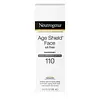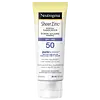What's inside
What's inside
 Key Ingredients
Key Ingredients

 Benefits
Benefits

 Concerns
Concerns

 Ingredients Side-by-side
Ingredients Side-by-side

Butyl Methoxydibenzoylmethane 3%
UV AbsorberHomosalate 15%
Skin ConditioningEthylhexyl Salicylate 5%
UV AbsorberOctocrylene 10%
UV AbsorberBenzophenone-3 6%
UV AbsorberWater
Skin ConditioningStyrene/Acrylates Copolymer
Silica
AbrasiveBeeswax
Emulsion StabilisingCyclopentasiloxane
EmollientEthylhexylglycerin
Skin ConditioningGlyceryl Stearate
EmollientPEG-100 Stearate
Acrylates/Dimethicone Copolymer
Skin ConditioningAcrylates/C10-30 Alkyl Acrylate Crosspolymer
Emulsion StabilisingChlorphenesin
AntimicrobialDisodium EDTA
Triethanolamine
BufferingDipotassium Glycyrrhizate
HumectantBHT
AntioxidantMethylisothiazolinone
PreservativeDiethylhexyl Ipdi
Polyethylene Naphthalate
Parfum
MaskingButyl Methoxydibenzoylmethane 3%, Homosalate 15%, Ethylhexyl Salicylate 5%, Octocrylene 10%, Benzophenone-3 6%, Water, Styrene/Acrylates Copolymer, Silica, Beeswax, Cyclopentasiloxane, Ethylhexylglycerin, Glyceryl Stearate, PEG-100 Stearate, Acrylates/Dimethicone Copolymer, Acrylates/C10-30 Alkyl Acrylate Crosspolymer, Chlorphenesin, Disodium EDTA, Triethanolamine, Dipotassium Glycyrrhizate, BHT, Methylisothiazolinone, Diethylhexyl Ipdi, Polyethylene Naphthalate, Parfum
Zinc Oxide 21.6%
Cosmetic ColorantAcrylates/Dimethicone Copolymer
Skin ConditioningC12-15 Alkyl Benzoate
AntimicrobialCaprylyl Glycol
EmollientCetyl Dimethicone
EmollientCetyl Dimethicone/Bis-Vinyldimethicone Crosspolymer
EmollientCetyl PEG/PPG-10/1 Dimethicone
EmulsifyingChlorphenesin
AntimicrobialChrysanthemum Parthenium Flower/Leaf/Stem Juice
AntioxidantDimethicone
EmollientEthyl Methicone
EmollientGlycerin
HumectantGlyceryl Behenate
EmollientOctyldodecyl Citrate Crosspolymer
HumectantPhenethyl Alcohol
MaskingPhenoxyethanol
PreservativePhenyl Trimethicone
Skin ConditioningPolyhydroxystearic Acid
EmulsifyingSilica
AbrasiveSodium Chloride
MaskingStyrene/Acrylates Copolymer
Triethoxycaprylylsilane
Water
Skin ConditioningZinc Oxide 21.6%, Acrylates/Dimethicone Copolymer, C12-15 Alkyl Benzoate, Caprylyl Glycol, Cetyl Dimethicone, Cetyl Dimethicone/Bis-Vinyldimethicone Crosspolymer, Cetyl PEG/PPG-10/1 Dimethicone, Chlorphenesin, Chrysanthemum Parthenium Flower/Leaf/Stem Juice, Dimethicone, Ethyl Methicone, Glycerin, Glyceryl Behenate, Octyldodecyl Citrate Crosspolymer, Phenethyl Alcohol, Phenoxyethanol, Phenyl Trimethicone, Polyhydroxystearic Acid, Silica, Sodium Chloride, Styrene/Acrylates Copolymer, Triethoxycaprylylsilane, Water
Ingredients Explained
These ingredients are found in both products.
Ingredients higher up in an ingredient list are typically present in a larger amount.
This polymer has film-forming properties and helps leave behind a soft film on the skin with oxygen permeability.
That's why you'll most likely find this in sunscreen formulations.
Chlorphenesin is a synthetic preservative. It helps protect a product against bacteria in order to extend shelf life. In most cases, Chlorphenesin is paired with other preservatives such as phenoxyethanol and caprylyl glycol.
Chlorphenesin is a biocide. This means it is able to help fight the microorganisms on our skin. It is also able to fight odor-releasing bacteria.
Chlorphenesin is soluble in both water and glycerin.
Studies show Chlorphenesin is easily absorbed by our skin. You should speak with a skincare professional if you have concerns about using Chlorphenesin.
Learn more about ChlorphenesinSilica, also known as silicon dioxide, is a naturally occurring mineral. It is used as a fine, spherical, and porous powder in cosmetics.
Though it has exfoliant properties, the function of silica varies depending on the product.
The unique structure of silica enhances the spreadability and adds smoothness, making it a great texture enhancer.
It is also used as an active carrier, emulsifier, and mattifier due to its ability to absorb excess oil.
In some products, tiny microneedles called spicules are made from silica or hydrolyzed sponge. When you rub them in, they lightly polish away dead skin layers and enhance the penetration of active ingredients.
Learn more about SilicaWe don't have a description for Styrene/Acrylates Copolymer yet.
Water. It's the most common cosmetic ingredient of all. You'll usually see it at the top of ingredient lists, meaning that it makes up the largest part of the product.
So why is it so popular? Water most often acts as a solvent - this means that it helps dissolve other ingredients into the formulation.
You'll also recognize water as that liquid we all need to stay alive. If you see this, drink a glass of water. Stay hydrated!
Learn more about Water